Nehemiah 8 meaning explained in AI Summary
This chapter marks a pivotal moment as the people of Jerusalem, having rebuilt their walls, now turn their attention to rebuilding their spiritual foundation.
1. Public Reading of the Law (v. 1-8):
- The people gather in the square before the Water Gate, requesting Ezra the priest to bring the Book of the Law of Moses.
- Ezra reads aloud from the Law from daybreak to midday.
- The people listen attentively, standing in reverence.
- Levites stationed among the people explain the meaning of the Law, ensuring everyone understands.
2. Joy and Celebration (v. 9-12):
- Nehemiah, Ezra, and the Levites urge the people not to mourn or weep, as they had been doing upon hearing the Law.
- They emphasize that this day is holy to the Lord and should be marked by rejoicing and sharing food with those in need.
- The people heed their words and celebrate with great joy, understanding that the Lord's commands bring life, not despair.
3. The Feast of Tabernacles (v. 13-18):
- The next day, the people assemble again to study the Law further.
- They discover the command to celebrate the Feast of Tabernacles, a seven-day festival commemorating God's provision during their wilderness wanderings.
- The people immediately begin preparations, building booths and gathering branches as instructed.
- They celebrate the Feast with great joy, reading from the Book of the Law daily and giving thanks to God.
Key Themes:
- The Power of God's Word: The chapter highlights the transformative power of hearing, understanding, and obeying God's Word. It brings conviction, repentance, joy, and unity.
- Spiritual Renewal: The rebuilding of Jerusalem's walls was just the beginning. True restoration comes from returning to God and His Law.
- Leadership & Teaching: Ezra, Nehemiah, and the Levites demonstrate effective spiritual leadership by making the Law accessible, explaining its meaning, and guiding the people in celebration.
- Joyful Obedience: The people's response to the Law is not one of burden but of joy. They recognize that God's commands are for their good and lead to life.
This chapter sets the stage for the rest of Nehemiah, where the people will face challenges in living out the Law. It emphasizes that true revival involves not just outward change but a deep inward transformation rooted in God's Word.
Nehemiah 8 bible study ai commentary
The spiritual revival of Israel marks a pivotal moment, shifting the focus from the physical reconstruction of Jerusalem's walls to the spiritual rebuilding of its people. The community, unified in purpose, gathers to hear the Word of God, which serves as the catalyst for conviction, instruction, and ultimately, joyful obedience. This chapter details a foundational "Great Awakening" where the authority of Scripture is re-established, leading to the proper worship and celebration of God's covenant commands.
Nehemiah 8 context
After the return from Babylonian exile, the Israelites under Nehemiah's governorship had just completed the monumental task of rebuilding Jerusalem's walls (Neh 6:15). This provided physical security and a renewed sense of national identity. The events of chapter 8 occur in the seventh month (Tishri), a sacred month in the Jewish calendar containing the Feast of Trumpets (Rosh Hashanah), the Day of Atonement (Yom Kippur), and the Feast of Tabernacles (Sukkot). This gathering was a spontaneous movement of the people, demonstrating a hunger for spiritual direction now that their physical city was secure. Linguistically, many of the common people would have spoken Aramaic, while the scriptures were written in Hebrew, necessitating the translation and explanation provided by the Levites.
Nehemiah 8:1-3
And all the people gathered as one man into the square before the Water Gate. And they told Ezra the scribe to bring the Book of the Law of Moses that the Lord had commanded Israel. So Ezra the priest brought the Law before the assembly, both men and women and all who could understand what they heard, on the first day of the seventh month. And he read from it facing the square before the Water Gate from early morning until midday, in the presence of the men and the women and those who could understand. And the ears of all the people were attentive to the Book of theLaw.
In-depth-analysis
- As one man: This Hebrew idiom emphasizes complete and profound unity. Their desire for God's Word was unanimous.
- They told Ezra: The initiative came from the people themselves, not from a decree by Ezra or Nehemiah. This signals a genuine spiritual hunger.
- Ezra the scribe: Ezra's primary role as a
sōp̄ēr(scribe) is emphasized—he is an expert in, and teacher of, the Law. His priesthood (kōhēn) gave him religious authority to handle the sacred text. - The Book of the Law of Moses: This refers to the Torah (the Pentateuch: Genesis-Deuteronomy), the foundation of Israel's covenant with God.
- All who could understand: The gathering was inclusive of men, women, and children old enough to comprehend, highlighting the importance of the Word for the entire covenant community.
- First day of the seventh month: This is Rosh Hashanah (Feast of Trumpets), a day of holy convocation (Lev 23:24), making the event a formal act of national worship.
- Early morning until midday: A reading lasting approximately 5-6 hours demonstrates extraordinary dedication and attentiveness from the people.
Bible references
- Deuteronomy 31:11-12: '...you shall read this law before all Israel... Assemble the people—men, women, children... so they can listen and learn to fear the LORD your God...' (The direct command being fulfilled).
- 2 Kings 23:2: 'And the king went up to the house of the Lord... and he read in their hearing all the words of the Book of the Covenant that had been found in the house of the Lord.' (Parallel event with King Josiah).
- Ezra 7:10: 'For Ezra had set his heart to study the Law of the Lord, and to do it and to teach his statutes and rules in Israel.' (Ezra's personal mission and qualification).
- Acts 15:21: 'For the law of Moses has been preached in every city from the earliest times and is read in the synagogues on every Sabbath.' (The continuation of this tradition of public reading).
Cross references
Deu 6:6-9 (Word in hearts and homes), Jos 1:8 (meditate on the law), Ps 119:97 (love for the law), Luk 4:16-21 (Jesus reads from Isaiah in the synagogue), 1Ti 4:13 (command to public reading of Scripture).
Nehemiah 8:4-6
And Ezra the scribe stood on a wooden platform that they had made for the purpose. ...And Ezra opened the book in the sight of all the people, for he was above all the people, and as he opened it all the people stood. And Ezra blessed the Lord, the great God, and all the people answered, “Amen, Amen,” lifting up their hands. And they bowed their heads and worshiped the Lord with their faces to the ground.
In-depth-analysis
- Wooden platform: Hebrew
migdal-‘ēṣ(tower of wood). This elevated pulpit was constructed specifically for the public reading of Scripture, giving it prominence and visibility. It is a functional precursor to the synagoguebimahand church pulpit. - All the people stood: Standing was a sign of profound respect and reverence for the Word of God as it was opened. This was not a command but a spontaneous reaction.
- Ezra blessed the Lord: Before reading, Ezra begins with doxology, directing praise to God, not focusing on the text itself. The Word is the means to worship the Giver of the Word.
- Amen, Amen: A solemn, affirmative response from the entire assembly, signifying "so be it" or "this is true." The repetition adds emphasis.
- Lifting up their hands... bowed their heads: These postures represent a full-bodied response of prayer, surrender, and humble adoration before God. They received the Word with their whole being.
Bible references
- 1 Kings 8:14, 22: '...the king turned around and blessed the whole assembly of Israel, while the whole assembly of Israel was standing. ...Then Solomon stood before the altar of the Lord... and spread out his hands toward heaven.' (Postures of blessing and prayer in corporate worship).
- Psalm 134:2: 'Lift up your hands to the sanctuary and bless the Lord!' (Lifting hands as an act of worship).
- Lamentations 3:41: 'Let us lift up our hearts and hands to God in heaven.' (Connecting the external posture with internal attitude).
- 1 Corinthians 14:16: '...how can anyone in the position of an outsider say “Amen” to your thanksgiving when he does not know what you are saying?' (The congregational "Amen" as a standard part of early Christian worship).
Cross references
Exd 12:27 (bowing in worship), 2Ch 20:18 (bowing and worshiping), 2Ch 29:30 (bowing and worshiping), Psa 28:2 (lifting hands in prayer), Psa 63:4 (lifting hands), Psa 95:6 (bowing in worship), 1Ti 2:8 (lifting holy hands in prayer).
Nehemiah 8:7-8
Also Jeshua, Bani, Sherebiah, Jamin, Akkub, Shabbethai, Hodiah, Maaseiah, Kelita, Azariah, Jozabad, Hanan, Pelaiah, the Levites, helped the people to understand the Law, while the people remained in their places. They read from the book, from the Law of God, clearly, and they gave the sense, so that the people understood the reading.
In-depth-analysis
- Helped the people to understand: The Levites, dispersed among the crowd, served as interpreters and teachers.
- Clearly: Hebrew
mǝp̄ōrāš. The word can mean "to make distinct" or "to translate." It implies they both read the Hebrew clearly and translated it. - Gave the sense: They didn't just translate word-for-word but provided explanation and application. This is the foundation of biblical exposition or a sermon.
- People understood the reading: The ultimate goal was comprehension (
bîn). The event was not a mere ritual; it was educational and transformational. The Spirit worked through intelligible teaching.
Polemics
This practice directly opposes the idea of a sacred text being accessible only to a priestly elite. Here, massive effort is expended to ensure every person, regardless of station, understood God's Word. The process (mǝp̄ōrāš and giving the sense) suggests an early form of a "Targum," an Aramaic paraphrase-translation of the Hebrew Bible. This act of public teaching was vital for a community that had spent decades in Aramaic-speaking Mesopotamia and needed the Hebrew text explained.
Bible references
- 2 Chronicles 17:9: 'And they taught in Judah, having the Book of the Law of the Lord with them. They went about through all the cities of Judah and taught the people.' (A historical precedent of Levites teaching the law).
- Luke 24:27: 'And beginning with Moses and all the Prophets, he [Jesus] interpreted to them in all the Scriptures the things concerning himself.' (The ultimate example of "giving the sense").
- Acts 8:30-31: 'So Philip ran to him and heard him reading Isaiah the prophet and asked, “Do you understand what you are reading?” And he said, “How can I, unless someone guides me?”' (Demonstrates the need for teaching to achieve understanding).
Cross references
Deu 33:10 (Levites to teach the law), Lev 10:11 (priests to teach), 2Ch 30:22 (Levites with good understanding), 2Ch 35:3 (Levites who taught Israel), Mal 2:7 (priest's lips guard knowledge).
Nehemiah 8:9-12
And Nehemiah, who was the governor, and Ezra the priest and scribe, and the Levites who taught the people, said to all the people, “This day is holy to the Lord your God; do not mourn or weep.” For all the people wept as they heard the words of the Law. Then he said to them, “Go your way. Eat the fat and drink sweet wine and send portions to anyone who has nothing ready, for this day is holy to our Lord. And do not be grieved, for the joy of the Lord is your strength.” So the Levites calmed all the people, saying, “Be quiet, for this day is holy; do not be grieved.” And all the people went their way to eat and drink and to send portions and to make great rejoicing, because they had understood the words that were declared to them.
In-depth-analysis
- People wept: Hearing the Law revealed their personal and corporate sin and their failure to live up to God's standard. This weeping was a sign of genuine conviction and repentance.
- This day is holy: The leaders redirect their emotions. While repentance is good, the day itself—a holy festival—is meant for celebration, not just mourning. The focus must be on God's grace, not just their sin.
- Joy of the LORD is your strength: A foundational theological statement. The Hebrew
mā‘ôzmeans fortress, refuge, or stronghold. Joy in the Lord is not just a fleeting emotion but a divine source of power and security. It is found in God's character and salvation, which the Law points to. - Eat the fat and drink sweet wine: These represent the best food and drink, signs of feasting and celebration.
- Send portions: A key element of biblical celebration is charity and concern for the poor. Joy was to be communal, not private. True worship always has a social dimension.
- Because they had understood: Their subsequent great rejoicing was not mindless festivity but was rooted in their comprehension of God's Word. Understanding leads to true, intelligent joy.
Bible references
- 2 Kings 22:11: 'When the king heard the words of the Book of the Law, he tore his clothes.' (Josiah's similar reaction of grief upon hearing the Law).
- Psalm 119:111: 'Your testimonies are my heritage forever, for they are the joy of my heart.' (Finding joy in God's Word).
- Philippians 4:4: 'Rejoice in the Lord always; again I will say, rejoice.' (The New Testament command for joy in the Lord).
- Galatians 5:22: 'But the fruit of the Spirit is love, joy, peace...' (Joy as a direct result of God's Spirit at work).
Cross references
Lev 23:24 (holy convocation), Deu 12:7 (rejoice before the Lord), Deu 16:11,14 (rejoice in the feasts), Psa 5:11 (let the righteous rejoice), Psa 30:5 (weeping to joy), Psa 51:12 (restore the joy of salvation), Rom 14:17 (kingdom of God is... joy in the Holy Spirit), Est 9:19,22 (feasting and sending portions).
Nehemiah 8:13-18
On the second day, the heads of fathers' houses of all the people, with the priests and the Levites, came together to Ezra the scribe to gain insight into the words of the Law. And they found it written in the Law that the Lord had commanded by Moses that the people of Israel should dwell in booths during the feast of the seventh month... So the whole assembly of those who had returned from the captivity made booths and lived in the booths. For from the days of Joshua the son of Nun to that day, the people of Israel had not done so. And there was very great rejoicing. And day by day, from the first day to the last day, he read from the Book of the Law of God. They kept the feast for seven days, and on the eighth day there was a solemn assembly, according to the rule.
In-depth-analysis
- On the second day: The revival was not a one-day emotional event. It immediately led to a desire for deeper study and application.
- Heads of fathers' houses: The leaders gather to ensure proper corporate obedience.
- Found it written: They "discover" the specific commands for the Feast of Tabernacles (
Sukkôt) in the Law (Leviticus 23). Their previous neglect shows how far they had strayed. - Dwell in booths: Building
sukkôt(booths/temporary shelters) was to commemorate God's provision for Israel during their 40 years of wilderness wanderings. - Not done so from the days of Joshua: This is likely a hyperbolic statement of emphasis. The feast had been observed before (e.g., Ezra 3:4; 1 Kings 8:2, 65), but never with this degree of universal participation, meticulous obedience, and spiritual understanding. This was the most authentic celebration in centuries.
- Very great rejoicing: This echoes and amplifies the joy from verse 12. Their obedience to a specific, tangible command brought even greater joy.
- Day by day... he read from the Book: The public reading of Scripture was not a one-off event but became a daily feature of the week-long festival, embedding the Word into the rhythm of their lives.
Bible references
- Leviticus 23:39-43: '...you shall celebrate the feast of the Lord for seven days... You shall dwell in booths for seven days... that your generations may know that I made the people of Israel dwell in booths when I brought them out of the land of Egypt.' (The explicit command for the Feast of Tabernacles).
- Deuteronomy 16:13-15: 'You shall keep the Feast of Booths seven days... and you shall be altogether joyful.' (The command emphasizing joy during the feast).
- John 7:2, 37-38: 'Now the Jews' Feast of Booths was at hand... On the last day of the feast... Jesus stood up and cried out, "If anyone thirsts, let him come to me and drink."' (Jesus uses the Feast's symbolism to declare Himself the source of living water).
- 2 Chronicles 7:8-9: 'Solomon kept the feast at that time for seven days... On the eighth day they held a solemn assembly.' (Solomon's celebration after dedicating the first temple).
Cross references
Exd 23:16 (Feast of Ingathering), Deu 31:10-13 (Reading Law at the feast), Jos 1:8 (meditating on Law day and night), Zec 14:16-19 (Prophetic future observance of the feast).
Nehemiah chapter 8 analysis
- Word-Centered Revival: The entire chapter demonstrates that genuine revival is not driven by personality or programs, but by the powerful, authoritative, and understandable Word of God. The Scripture itself is the primary agent of change.
- Model for Worship: The sequence in this chapter—gathering with unity, revering the Word, hearing it explained, responding with conviction, being corrected toward joy, and obeying its commands—serves as a timeless template for corporate worship in both Judaism (synagogue service) and Christianity.
- Partnership in Ministry: The chapter highlights the seamless cooperation between the civil governor (Nehemiah) and the spiritual leader (Ezra). Both are united in the goal of re-establishing covenant faithfulness in Israel, showing an ideal relationship between "church and state" where both support the spiritual well-being of the people.
- Conviction to Celebration: Nehemiah 8 powerfully illustrates the proper theological progression. Godly sorrow over sin (weeping) is a necessary first step (2 Cor 7:10), but it is not the destination. The ultimate goal is to move from conviction to celebration of God's grace and forgiveness, which leads to a "joy of the LORD" that becomes a spiritual fortress (
mā‘ôz).
Nehemiah 8 summary
The people of Jerusalem, having secured their city physically, gather as one to ask Ezra the Scribe to read the Law of Moses. The reading, which includes explanation from the Levites, leads to mass weeping and conviction. However, Nehemiah and Ezra instruct the people that the day is holy and a time for joy, declaring that "the joy of the LORD is your strength." The people obey, feasting and sharing with the poor. The revival deepens as they study the Law further, rediscover the forgotten practice of the Feast of Tabernacles, and celebrate it with a universal obedience and joy not seen since the days of Joshua.
Nehemiah 8 AI Image Audio and Video
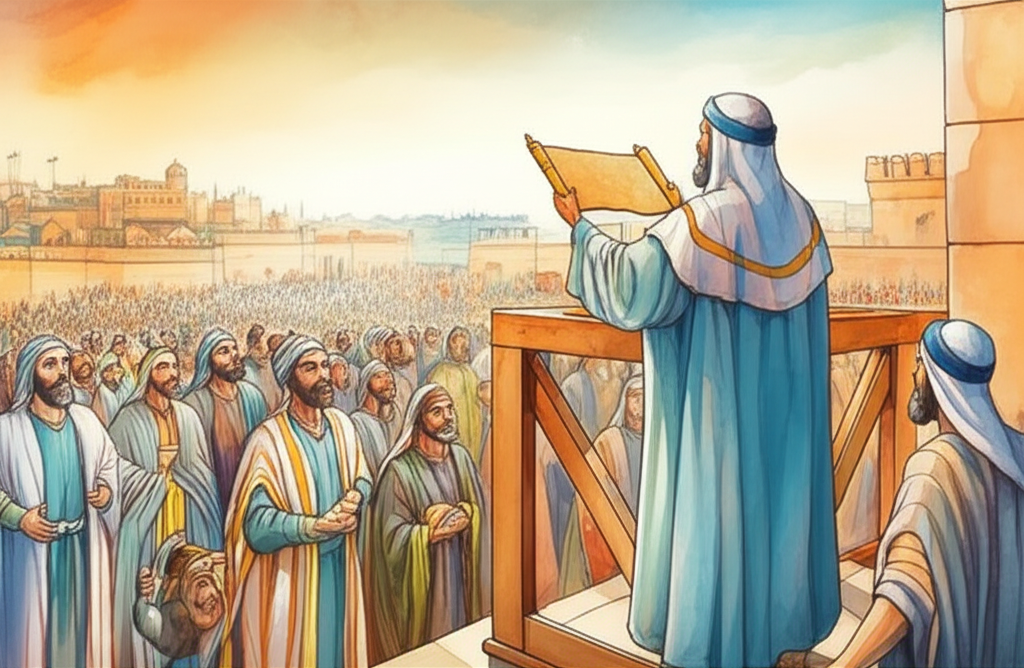

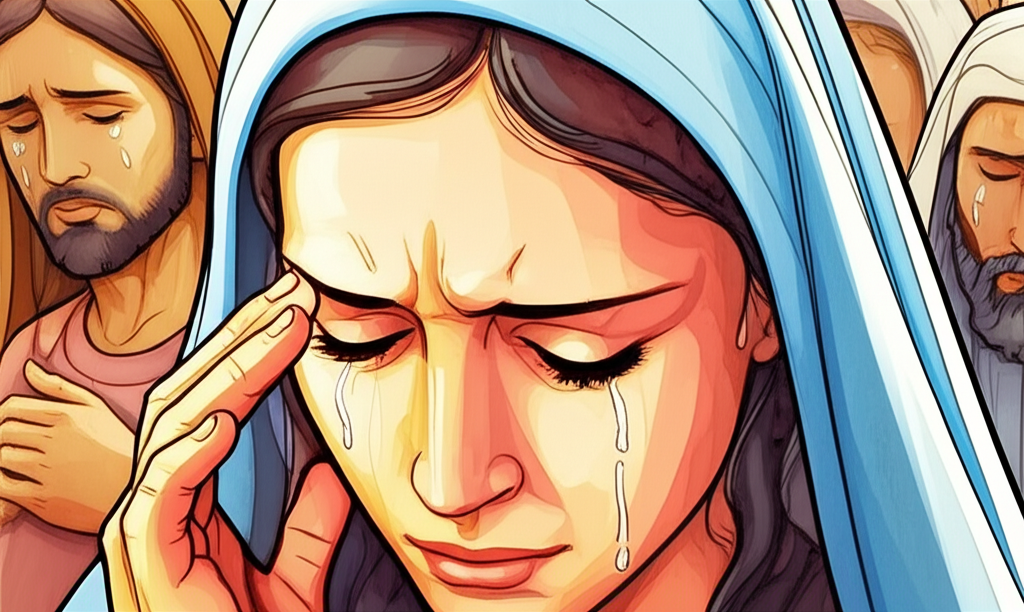
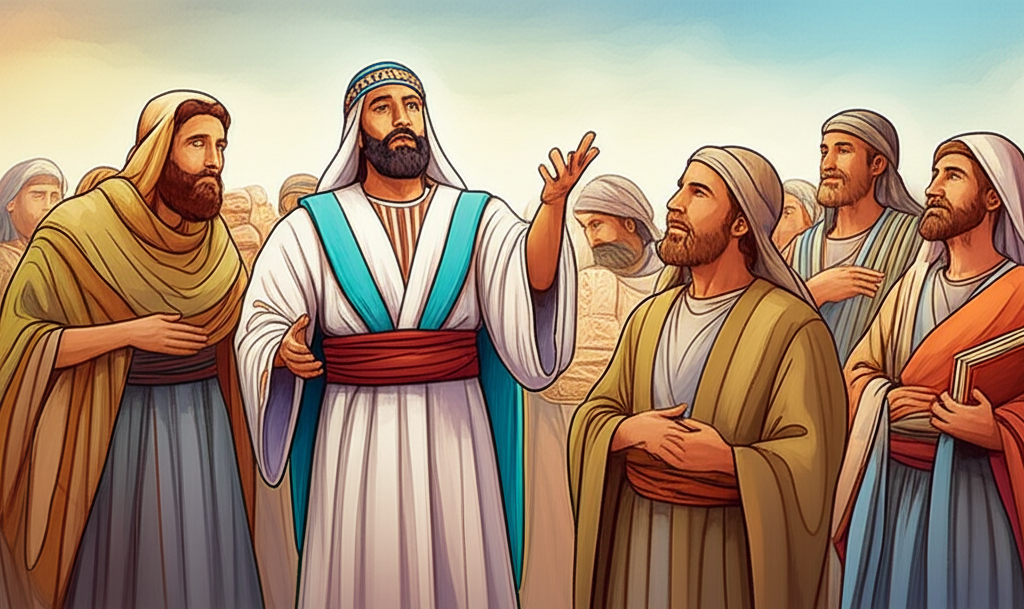
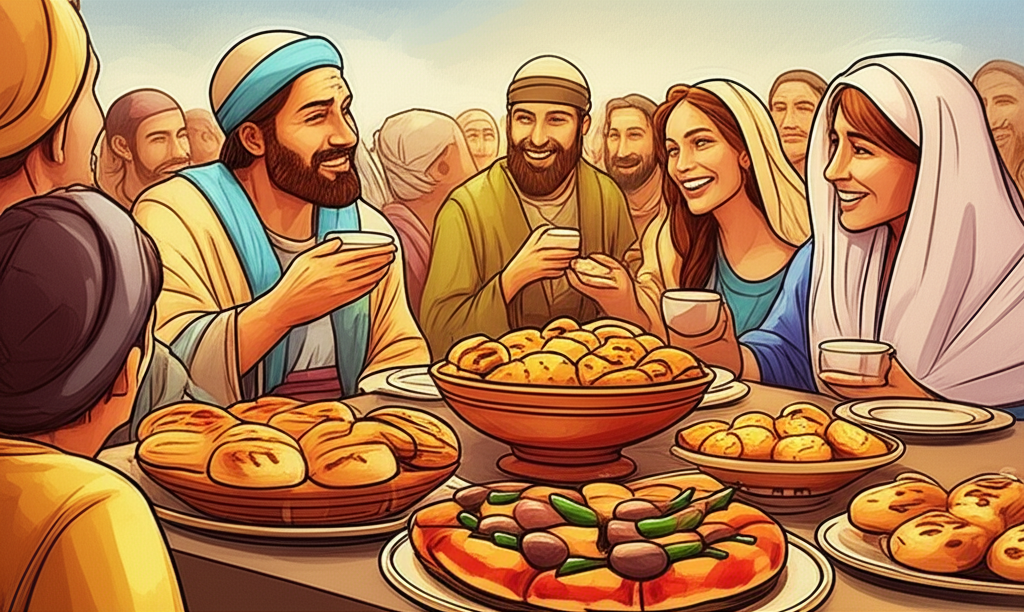
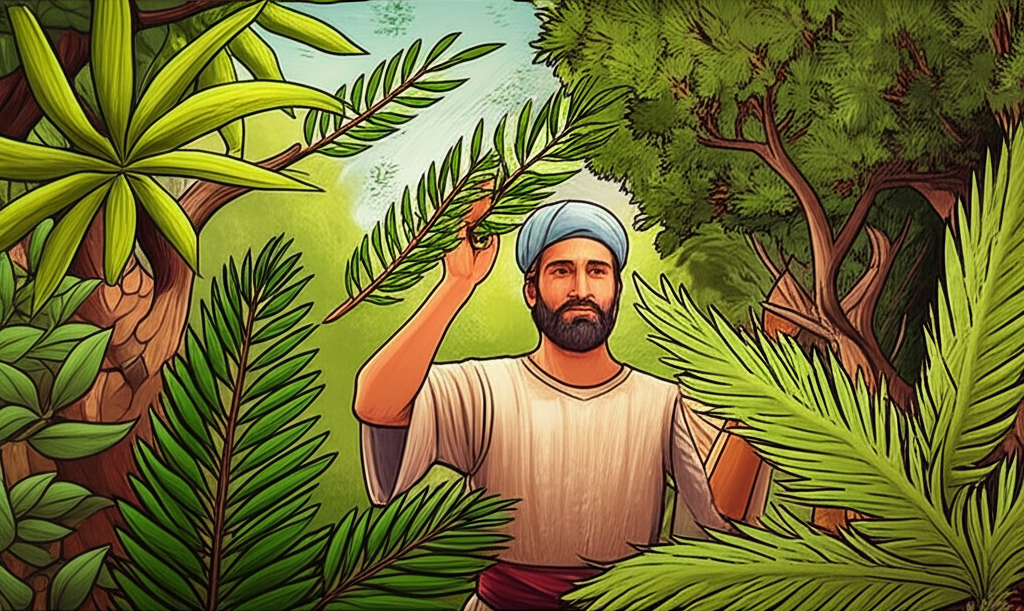


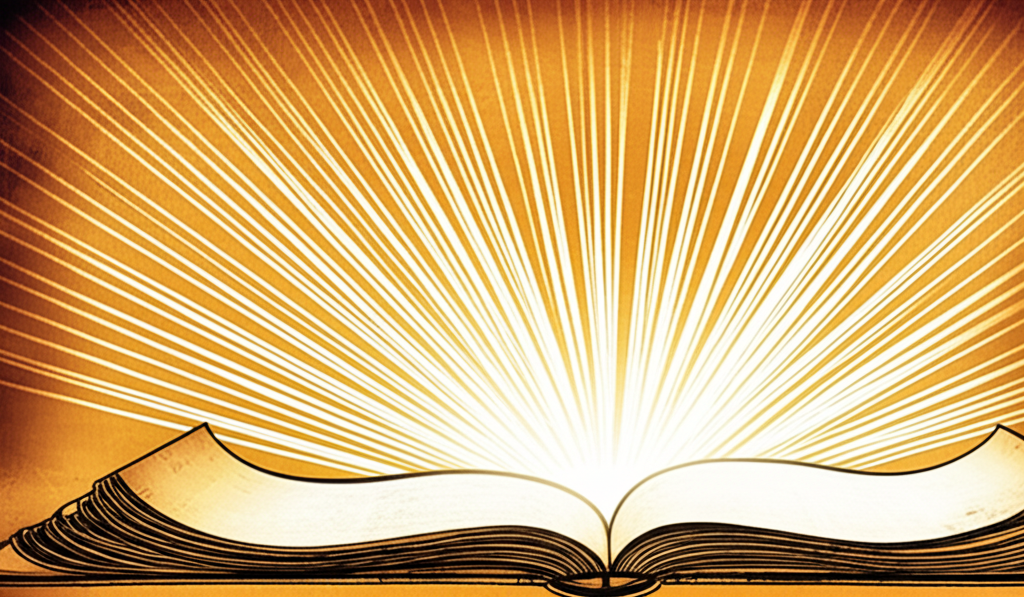
Nehemiah chapter 8 kjv
- 1 And all the people gathered themselves together as one man into the street that was before the water gate; and they spake unto Ezra the scribe to bring the book of the law of Moses, which the LORD had commanded to Israel.
- 2 And Ezra the priest brought the law before the congregation both of men and women, and all that could hear with understanding, upon the first day of the seventh month.
- 3 And he read therein before the street that was before the water gate from the morning until midday, before the men and the women, and those that could understand; and the ears of all the people were attentive unto the book of the law.
- 4 And Ezra the scribe stood upon a pulpit of wood, which they had made for the purpose; and beside him stood Mattithiah, and Shema, and Anaiah, and Urijah, and Hilkiah, and Maaseiah, on his right hand; and on his left hand, Pedaiah, and Mishael, and Malchiah, and Hashum, and Hashbadana, Zechariah, and Meshullam.
- 5 And Ezra opened the book in the sight of all the people; (for he was above all the people;) and when he opened it, all the people stood up:
- 6 And Ezra blessed the LORD, the great God. And all the people answered, Amen, Amen, with lifting up their hands: and they bowed their heads, and worshipped the LORD with their faces to the ground.
- 7 Also Jeshua, and Bani, and Sherebiah, Jamin, Akkub, Shabbethai, Hodijah, Maaseiah, Kelita, Azariah, Jozabad, Hanan, Pelaiah, and the Levites, caused the people to understand the law: and the people stood in their place.
- 8 So they read in the book in the law of God distinctly, and gave the sense, and caused them to understand the reading.
- 9 And Nehemiah, which is the Tirshatha, and Ezra the priest the scribe, and the Levites that taught the people, said unto all the people, This day is holy unto the LORD your God; mourn not, nor weep. For all the people wept, when they heard the words of the law.
- 10 Then he said unto them, Go your way, eat the fat, and drink the sweet, and send portions unto them for whom nothing is prepared: for this day is holy unto our LORD: neither be ye sorry; for the joy of the LORD is your strength.
- 11 So the Levites stilled all the people, saying, Hold your peace, for the day is holy; neither be ye grieved.
- 12 And all the people went their way to eat, and to drink, and to send portions, and to make great mirth, because they had understood the words that were declared unto them.
- 13 And on the second day were gathered together the chief of the fathers of all the people, the priests, and the Levites, unto Ezra the scribe, even to understand the words of the law.
- 14 And they found written in the law which the LORD had commanded by Moses, that the children of Israel should dwell in booths in the feast of the seventh month:
- 15 And that they should publish and proclaim in all their cities, and in Jerusalem, saying, Go forth unto the mount, and fetch olive branches, and pine branches, and myrtle branches, and palm branches, and branches of thick trees, to make booths, as it is written.
- 16 So the people went forth, and brought them, and made themselves booths, every one upon the roof of his house, and in their courts, and in the courts of the house of God, and in the street of the water gate, and in the street of the gate of Ephraim.
- 17 And all the congregation of them that were come again out of the captivity made booths, and sat under the booths: for since the days of Jeshua the son of Nun unto that day had not the children of Israel done so. And there was very great gladness.
- 18 Also day by day, from the first day unto the last day, he read in the book of the law of God. And they kept the feast seven days; and on the eighth day was a solemn assembly, according unto the manner.
Nehemiah chapter 8 nkjv
- 1 Now all the people gathered together as one man in the open square that was in front of the Water Gate; and they told Ezra the scribe to bring the Book of the Law of Moses, which the LORD had commanded Israel.
- 2 So Ezra the priest brought the Law before the assembly of men and women and all who could hear with understanding on the first day of the seventh month.
- 3 Then he read from it in the open square that was in front of the Water Gate from morning until midday, before the men and women and those who could understand; and the ears of all the people were attentive to the Book of the Law.
- 4 So Ezra the scribe stood on a platform of wood which they had made for the purpose; and beside him, at his right hand, stood Mattithiah, Shema, Anaiah, Urijah, Hilkiah, and Maaseiah; and at his left hand Pedaiah, Mishael, Malchijah, Hashum, Hashbadana, Zechariah, and Meshullam.
- 5 And Ezra opened the book in the sight of all the people, for he was standing above all the people; and when he opened it, all the people stood up.
- 6 And Ezra blessed the LORD, the great God. Then all the people answered, "Amen, Amen!" while lifting up their hands. And they bowed their heads and worshiped the LORD with their faces to the ground.
- 7 Also Jeshua, Bani, Sherebiah, Jamin, Akkub, Shabbethai, Hodijah, Maaseiah, Kelita, Azariah, Jozabad, Hanan, Pelaiah, and the Levites, helped the people to understand the Law; and the people stood in their place.
- 8 So they read distinctly from the book, in the Law of God; and they gave the sense, and helped them to understand the reading.
- 9 And Nehemiah, who was the governor, Ezra the priest and scribe, and the Levites who taught the people said to all the people, "This day is holy to the LORD your God; do not mourn nor weep." For all the people wept, when they heard the words of the Law.
- 10 Then he said to them, "Go your way, eat the fat, drink the sweet, and send portions to those for whom nothing is prepared; for this day is holy to our Lord. Do not sorrow, for the joy of the LORD is your strength."
- 11 So the Levites quieted all the people, saying, "Be still, for the day is holy; do not be grieved."
- 12 And all the people went their way to eat and drink, to send portions and rejoice greatly, because they understood the words that were declared to them.
- 13 Now on the second day the heads of the fathers' houses of all the people, with the priests and Levites, were gathered to Ezra the scribe, in order to understand the words of the Law.
- 14 And they found written in the Law, which the LORD had commanded by Moses, that the children of Israel should dwell in booths during the feast of the seventh month,
- 15 and that they should announce and proclaim in all their cities and in Jerusalem, saying, "Go out to the mountain, and bring olive branches, branches of oil trees, myrtle branches, palm branches, and branches of leafy trees, to make booths, as it is written."
- 16 Then the people went out and brought them and made themselves booths, each one on the roof of his house, or in their courtyards or the courts of the house of God, and in the open square of the Water Gate and in the open square of the Gate of Ephraim.
- 17 So the whole assembly of those who had returned from the captivity made booths and sat under the booths; for since the days of Joshua the son of Nun until that day the children of Israel had not done so. And there was very great gladness.
- 18 Also day by day, from the first day until the last day, he read from the Book of the Law of God. And they kept the feast seven days; and on the eighth day there was a sacred assembly, according to the prescribed manner.
Nehemiah chapter 8 niv
- 1 all the people came together as one in the square before the Water Gate. They told Ezra the teacher of the Law to bring out the Book of the Law of Moses, which the LORD had commanded for Israel.
- 2 So on the first day of the seventh month Ezra the priest brought the Law before the assembly, which was made up of men and women and all who were able to understand.
- 3 He read it aloud from daybreak till noon as he faced the square before the Water Gate in the presence of the men, women and others who could understand. And all the people listened attentively to the Book of the Law.
- 4 Ezra the teacher of the Law stood on a high wooden platform built for the occasion. Beside him on his right stood Mattithiah, Shema, Anaiah, Uriah, Hilkiah and Maaseiah; and on his left were Pedaiah, Mishael, Malkijah, Hashum, Hashbaddanah, Zechariah and Meshullam.
- 5 Ezra opened the book. All the people could see him because he was standing above them; and as he opened it, the people all stood up.
- 6 Ezra praised the LORD, the great God; and all the people lifted their hands and responded, "Amen! Amen!" Then they bowed down and worshiped the LORD with their faces to the ground.
- 7 The Levites?Jeshua, Bani, Sherebiah, Jamin, Akkub, Shabbethai, Hodiah, Maaseiah, Kelita, Azariah, Jozabad, Hanan and Pelaiah?instructed the people in the Law while the people were standing there.
- 8 They read from the Book of the Law of God, making it clear and giving the meaning so that the people understood what was being read.
- 9 Then Nehemiah the governor, Ezra the priest and teacher of the Law, and the Levites who were instructing the people said to them all, "This day is holy to the LORD your God. Do not mourn or weep." For all the people had been weeping as they listened to the words of the Law.
- 10 Nehemiah said, "Go and enjoy choice food and sweet drinks, and send some to those who have nothing prepared. This day is holy to our Lord. Do not grieve, for the joy of the LORD is your strength."
- 11 The Levites calmed all the people, saying, "Be still, for this is a holy day. Do not grieve."
- 12 Then all the people went away to eat and drink, to send portions of food and to celebrate with great joy, because they now understood the words that had been made known to them.
- 13 On the second day of the month, the heads of all the families, along with the priests and the Levites, gathered around Ezra the teacher to give attention to the words of the Law.
- 14 They found written in the Law, which the LORD had commanded through Moses, that the Israelites were to live in temporary shelters during the festival of the seventh month
- 15 and that they should proclaim this word and spread it throughout their towns and in Jerusalem: "Go out into the hill country and bring back branches from olive and wild olive trees, and from myrtles, palms and shade trees, to make temporary shelters"?as it is written.
- 16 So the people went out and brought back branches and built themselves temporary shelters on their own roofs, in their courtyards, in the courts of the house of God and in the square by the Water Gate and the one by the Gate of Ephraim.
- 17 The whole company that had returned from exile built temporary shelters and lived in them. From the days of Joshua son of Nun until that day, the Israelites had not celebrated it like this. And their joy was very great.
- 18 Day after day, from the first day to the last, Ezra read from the Book of the Law of God. They celebrated the festival for seven days, and on the eighth day, in accordance with the regulation, there was an assembly.
Nehemiah chapter 8 esv
- 1 And all the people gathered as one man into the square before the Water Gate. And they told Ezra the scribe to bring the Book of the Law of Moses that the LORD had commanded Israel.
- 2 So Ezra the priest brought the Law before the assembly, both men and women and all who could understand what they heard, on the first day of the seventh month.
- 3 And he read from it facing the square before the Water Gate from early morning until midday, in the presence of the men and the women and those who could understand. And the ears of all the people were attentive to the Book of the Law.
- 4 And Ezra the scribe stood on a wooden platform that they had made for the purpose. And beside him stood Mattithiah, Shema, Anaiah, Uriah, Hilkiah, and Maaseiah on his right hand, and Pedaiah, Mishael, Malchijah, Hashum, Hashbaddanah, Zechariah, and Meshullam on his left hand.
- 5 And Ezra opened the book in the sight of all the people, for he was above all the people, and as he opened it all the people stood.
- 6 And Ezra blessed the LORD, the great God, and all the people answered, "Amen, Amen," lifting up their hands. And they bowed their heads and worshiped the LORD with their faces to the ground.
- 7 Also Jeshua, Bani, Sherebiah, Jamin, Akkub, Shabbethai, Hodiah, Maaseiah, Kelita, Azariah, Jozabad, Hanan, Pelaiah, the Levites, helped the people to understand the Law, while the people remained in their places.
- 8 They read from the book, from the Law of God, clearly, and they gave the sense, so that the people understood the reading.
- 9 And Nehemiah, who was the governor, and Ezra the priest and scribe, and the Levites who taught the people said to all the people, "This day is holy to the LORD your God; do not mourn or weep." For all the people wept as they heard the words of the Law.
- 10 Then he said to them, "Go your way. Eat the fat and drink sweet wine and send portions to anyone who has nothing ready, for this day is holy to our Lord. And do not be grieved, for the joy of the LORD is your strength."
- 11 So the Levites calmed all the people, saying, "Be quiet, for this day is holy; do not be grieved."
- 12 And all the people went their way to eat and drink and to send portions and to make great rejoicing, because they had understood the words that were declared to them.
- 13 On the second day the heads of fathers' houses of all the people, with the priests and the Levites, came together to Ezra the scribe in order to study the words of the Law.
- 14 And they found it written in the Law that the LORD had commanded by Moses that the people of Israel should dwell in booths during the feast of the seventh month,
- 15 and that they should proclaim it and publish it in all their towns and in Jerusalem, "Go out to the hills and bring branches of olive, wild olive, myrtle, palm, and other leafy trees to make booths, as it is written."
- 16 So the people went out and brought them and made booths for themselves, each on his roof, and in their courts and in the courts of the house of God, and in the square at the Water Gate and in the square at the Gate of Ephraim.
- 17 And all the assembly of those who had returned from the captivity made booths and lived in the booths, for from the days of Jeshua the son of Nun to that day the people of Israel had not done so. And there was very great rejoicing.
- 18 And day by day, from the first day to the last day, he read from the Book of the Law of God. They kept the feast seven days, and on the eighth day there was a solemn assembly, according to the rule.
Nehemiah chapter 8 nlt
- 1 all the people assembled with a unified purpose at the square just inside the Water Gate. They asked Ezra the scribe to bring out the Book of the Law of Moses, which the LORD had given for Israel to obey.
- 2 So on October 8 Ezra the priest brought the Book of the Law before the assembly, which included the men and women and all the children old enough to understand.
- 3 He faced the square just inside the Water Gate from early morning until noon and read aloud to everyone who could understand. All the people listened closely to the Book of the Law.
- 4 Ezra the scribe stood on a high wooden platform that had been made for the occasion. To his right stood Mattithiah, Shema, Anaiah, Uriah, Hilkiah, and Maaseiah. To his left stood Pedaiah, Mishael, Malkijah, Hashum, Hashbaddanah, Zechariah, and Meshullam.
- 5 Ezra stood on the platform in full view of all the people. When they saw him open the book, they all rose to their feet.
- 6 Then Ezra praised the LORD, the great God, and all the people chanted, "Amen! Amen!" as they lifted their hands. Then they bowed down and worshiped the LORD with their faces to the ground.
- 7 The Levites ? Jeshua, Bani, Sherebiah, Jamin, Akkub, Shabbethai, Hodiah, Maaseiah, Kelita, Azariah, Jozabad, Hanan, and Pelaiah ? then instructed the people in the Law while everyone remained in their places.
- 8 They read from the Book of the Law of God and clearly explained the meaning of what was being read, helping the people understand each passage.
- 9 Then Nehemiah the governor, Ezra the priest and scribe, and the Levites who were interpreting for the people said to them, "Don't mourn or weep on such a day as this! For today is a sacred day before the LORD your God." For the people had all been weeping as they listened to the words of the Law.
- 10 And Nehemiah continued, "Go and celebrate with a feast of rich foods and sweet drinks, and share gifts of food with people who have nothing prepared. This is a sacred day before our Lord. Don't be dejected and sad, for the joy of the LORD is your strength!"
- 11 And the Levites, too, quieted the people, telling them, "Hush! Don't weep! For this is a sacred day."
- 12 So the people went away to eat and drink at a festive meal, to share gifts of food, and to celebrate with great joy because they had heard God's words and understood them.
- 13 On October 9 the family leaders of all the people, together with the priests and Levites, met with Ezra the scribe to go over the Law in greater detail.
- 14 As they studied the Law, they discovered that the LORD had commanded through Moses that the Israelites should live in shelters during the festival to be held that month.
- 15 He had said that a proclamation should be made throughout their towns and in Jerusalem, telling the people to go to the hills to get branches from olive, wild olive, myrtle, palm, and other leafy trees. They were to use these branches to make shelters in which they would live during the festival, as prescribed in the Law.
- 16 So the people went out and cut branches and used them to build shelters on the roofs of their houses, in their courtyards, in the courtyards of God's Temple, or in the squares just inside the Water Gate and the Ephraim Gate.
- 17 So everyone who had returned from captivity lived in these shelters during the festival, and they were all filled with great joy! The Israelites had not celebrated like this since the days of Joshua son of Nun.
- 18 Ezra read from the Book of the Law of God on each of the seven days of the festival. Then on the eighth day they held a solemn assembly, as was required by law.
- Bible Book of Nehemiah
- 1 Report from Jerusalem
- 2 Nehemiah Sent to Judah
- 3 Rebuilding the Wall
- 4 Opposition to the Work
- 5 Nehemiah Stops Oppression of the Poor
- 6 Conspiracy Against Nehemiah
- 7 Lists of Returned Exiles
- 8 Ezra Reads the Law
- 9 The People of Israel Confess Their Sin
- 10 The People Who Sealed the Covenant
- 11 The Leaders in Jerusalem
- 12 Priests and Levites
- 13 Nehemiah's Final Reforms